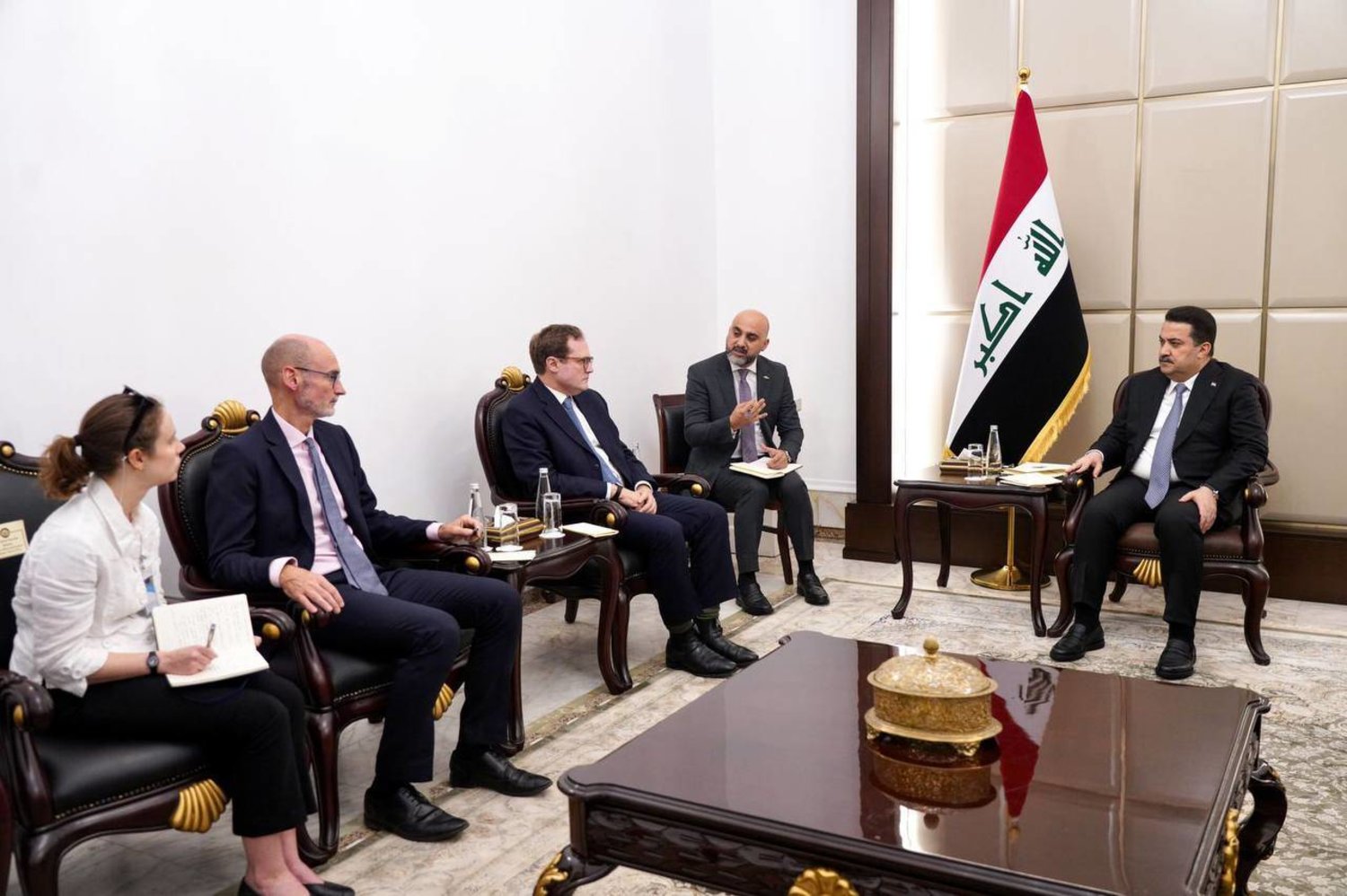From August 21st to the 23rd of this month, Tom Tugendhat, the State Minister for Security at the British Home Office, embarked on a visit to Iraq. During this visit, he engaged in meetings with several prominent Iraqi officials, including Prime Minister Mohammed Shiaa Al-Sudani, Foreign Minister Fuad Hussein, Interior Minister Lieutenant General Abdul Amir Al-Shammari, National Security Advisor Qasim Al-Araji, as well as Nechirvan Barzani, the President of the Kurdistan Region. Further discussions were held with Qubad Talabani, Deputy Prime Minister of the Region, and Reber Ahmed, the Interior Minister of the Region.
According to information available on the British government’s website, the primary objective of this visit was to strengthen security cooperation between the United Kingdom, Iraq, and the broader Middle East region. Additionally, the visit aimed to foster and build upon the existing relationship between the two nations.
Multiple Files
The visit of the British minister and his meetings with political and security officials in Baghdad and Kurdistan focused on a range of common security issues between Iraq and Britain, as well as opportunities for cooperation between the two countries to enhance Iraqi and British security. Among the most prominent of these files are the following:
- Supporting Iraq in the fight against terrorism is a top priority for the British government. This commitment extends to maintaining the successes achieved by the international coalition, including Britain, in defeating the “ISIS” organization. To underscore this dedication, on June 21st of the previous year, the British government appointed Stephen Hitchen, who serves as the Director of Counter-Terrorism at the Foreign Office, as its new ambassador to Iraq.
During his visit to Iraq, Tom Tugendhat made it a central point of discussion to address the assistance provided to Iraq in combating terrorism. The British minister conveyed London’s readiness to support the Iraqi security forces by equipping them with modern technology and equipment. This support aims to enhance their capacity to combat terrorism effectively, eradicate “ISIS,” and establish lasting security stability in Iraq.
The British minister engaged in discussions with the Iraqi National Security Advisor on strategies to bolster the exchange of information between the two nations, thereby reinforcing British-Iraqi collaboration in the fight against terrorism. Additionally, they explored the potential of formalizing their joint efforts by considering the signing of a memorandum of understanding.
The significance of information sharing between the two countries in the battle against terrorism came to the forefront following a revelation by Iraqi intelligence on June 29th of the previous year. This revelation exposed an “ISIS” plot involving British terrorists intending to carry out large-scale terrorist operations in the United Kingdom, targeting a major public gathering.
The British contribution extended beyond providing military support and training to Iraqi forces, aimed at bolstering their capabilities and thwarting the resurgence of the “ISIS” terrorist organization, thereby safeguarding Iraq’s security. The British Royal Air Force played an active role in this effort, specifically targeting operational elements of the organization located within Iraqi territory.
On May 2nd of the previous year, “Typhoon” aircraft conducted an attack on two terrorist targets situated in northeastern Iraq. This operation was conducted in close cooperation between British forces and the Iraqi government. Its primary goal was to prevent the resurgence of “ISIS” within Iraq, a scenario that could potentially jeopardize British interests in the region.
- The visit also aimed to further strengthen the robust security cooperation between Iraq and Britain in their joint efforts against terrorism. It sought to broaden the spectrum of security relations between the two nations to effectively address shared threats originating from organized crime. These threats encompass human trafficking, drug trafficking, and money laundering, all of which operate as interconnected elements within a criminal network that detrimentally impacts the stability of Iraq, as highlighted by the British minister.
Tugendhat emphasized that thanks to specialized training provided by the British armed forces, Iraqi law enforcement authorities will now employ the same counter-terrorism techniques that successfully dismantled the infrastructure of “ISIS.” These techniques will be used to pursue criminal gangs and organized crime groups involved in facilitating human smuggling operations bound for the United Kingdom.
The British interest in assisting Iraq in combating organized crime networks arises in response to the escalating migrant crisis directed towards Britain. This crisis has emerged as a paramount concern for Prime Minister Rishi Sunak, who has made a resolute commitment to prevent migrant boats from reaching British shores. The number of migrants attempting this journey has surged to approximately 18,000 this year.
Furthermore, the British government is currently contending with a legal challenge pertaining to a specific aspect of its strategy to relocate illegal migrants who enter the UK to Rwanda. This legal matter is scheduled for review by the Supreme Court in October.
Hence, London is directing its efforts towards addressing the problem at its origin. Tugendhat emphasized, “By tracking the financial flows and the pathways they utilize, you can uncover the leaders orchestrating many of these operations right here in Iraq.” Consequently, he pledged that the human traffickers responsible for the influx of thousands of small boats destined for Britain will be pursued with the same vigor as “ISIS” terrorists in countries such as Iraq.
- Enhancing Drug Control Coordination: During his visit to Iraq, Tugendhat announced increased British support for Iraqi security forces in their endeavors to combat drug production and trafficking. Of particular concern is Captagon, a drug originating from factories in Syria. Tugendhat underscored that “Iraq is not the sole nation affected by this drug; neighboring countries such as Jordan and Saudi Arabia, both allies of Britain, have also been significantly impacted by its presence.” He conveyed to the Associated Press that there exists a nexus between drugs, human trafficking, terrorism, and violence, with repercussions extending beyond Iraq to encompass the entire region, affecting numerous British allies within it.
While Iraq has historically served as a transit country for drugs produced in Syria, there has been a concerning trend of some drug trafficking groups establishing production facilities within Iraq itself. Tugendhat highlighted that Iraqi authorities made a significant discovery in July of the previous year, unearthing a Captagon production facility in a province bordering Saudi Arabia.
- The meeting between Iraqi Prime Minister Mohammed Shiaa Al-Sudani and the British minister included discussions about the extradition of suspects to face charges in the corruption case infamously known as the “Century Theft.” This case involves the alleged embezzlement of $2.5 billion from the government-owned Rafidain Bank. Notably, one of the accused individuals holds British nationality, while others possess American citizenship.
Iraq had previously sought cooperation from both the United States and Britain, working in conjunction with Iraqi authorities, to facilitate the extradition of three former Iraqi officials implicated in facilitating the misappropriation of funds. Baghdad asserts that these individuals are currently located abroad. Both Washington and London have expressed their commitment to cooperating in the execution of arrest warrants issued against these suspects in accordance with Iraqi law. Furthermore, they have pledged to assist in the repatriation of embezzled funds held in their respective banks.
Continued Interest
The visit of Tom Tugendhat, the British State Minister for Security at the Home Office, to Iraq is part of a broader British initiative aimed at fortifying ties with the nation. This initiative follows the hosting of the second Iraq-UK Strategic Dialogue on July 4th and 5th of the previous year, as well as the signing of the Strategic Partnership Agreement between the two countries in Baghdad on June 8, 2021.
These endeavors underscore Britain’s enduring commitment to the security, stability, and sovereignty of Iraq. London’s primary objective is to assist the Iraqi government in implementing necessary reforms and policy adjustments to address a spectrum of challenges confronting the nation. These challenges have both direct and indirect implications for British interests in the region, with a particular emphasis on British security, notably the pressing issue of migrants, which features prominently on the current British government’s agenda.


